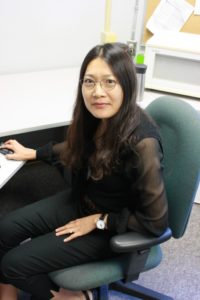Know Your Profs is an ongoing series of profiles on the instructors at Camosun College. Every issue we ask a different instructor at Camosun the same 10 questions in an attempt to get to know them a little better.
Do you have an instructor that you want to see interviewed in the paper? Maybe you want to know more about one of your teachers, but you’re too busy, or shy, to ask? Email editor@nexusnewspaper.com and we’ll add your instructor to our list of teachers to talk to.
This issue we talked to Camosun Language instructor Esther Lee about the connection between her traditional roots and teaching, disliking marking, and traffic woes.
1. What do you teach and how long have you been at Camosun?
I’ve been teaching Korean for six years at Camosun.
2. What do you personally get out of teaching?
There are many benefits from teaching. I get to know amazing students with many different backgrounds. I enjoy my thought process while preparing classes. It provides me with an opportunity to be creative and gives a positive energy for my life. Teaching Korean also helps me feel close to my Korean traditional roots. Students always bring up something new that helps me stay up to date with current Korean pop culture.

3. What’s one thing you wish your students knew about you?
I sincerely care about students. I am very happy to see students’ success and feel concerned when students are not doing well. Students are busy with many other courses and may be working part- or full-time. When they come to my class, I want them to feel relaxed and comfortable and have fun learning without feeling anxious about being judged. It is my goal to create a welcoming, inclusive, and enjoyable class environment for students. I try to organize my classes to provide opportunities for students to get to know other classmates and to support one another and make friends. It is my great joy to see students’ progress and success.
4. What’s one thing you wish they didn’t know about you?
I don’t enjoy marking and complain a lot about marking. My husband says, “Find out who assigned the marking and talk to them.”
5. What’s the best thing that’s ever happened to you as a teacher here?
In the fall of 2015 I had a small, diverse, and amazing KORE 101 class. There was the first Korean speech contest in BC; several KORE 101 students entered the competition, and they put in a lot of extra work. In the end we got two awards: first and third place. It was so wonderful to see their effort rewarded. Also, Camosun succeeded with an application to a Korean government organization for language materials to support the Korean courses. Last November another application to receive cultural materials such as Korean traditional clothing and games was successful. With these generous supports, I am organizing a Korean cultural festival this September. I hope many students, faculty, and staff will take the opportunity to experience a bit of Korean culture.
6. What’s the worst thing that’s ever happened to you as a teacher here?
Sadly, due to a budget cut, Korean courses were not offered for a year and half.
7. What do you see in the future of post-secondary education?
The population of young domestic students is decreasing, and that impacts enrolment at post-secondary institutions. A similar phenomenon has already happened in Korea. So in order to sustain the student numbers, it is important to attract more international students. Many institutions realize this and the competition is stiff. There is a need for every institution, including Camosun, to have distinct programs that are different from other institutions in order to attract a lot more international students. Most students are concerned about being highly educated in their major subject area. Besides that, students live in an increasingly global world where it would be a great asset to have experience and understanding about other cultures, including some of the world languages.
8. What do you do to relax on the weekends?
I listen to my favourite music. This helps me to relax, and it refreshes my energy. I think music is powerful. Also, I like looking after flowers, shopping, hitting a tennis ball, hiking, and watching Korean TV dramas, which distract me for a time. But my mind is never far from thinking about how to make learning Korean more motivating and fun.
9. What is your favourite meal?
My all-time favourite meals are any dish with a combination of vegetables (except cilantro), rice, noodles, tofu, and fish. I am not a great fan of meat.
10. What’s your biggest pet peeve?
Drivers who honk unnecessarily, loud cars or motorcycles without a good muffler, and careless cyclists who don’t use a light when it is dark.
